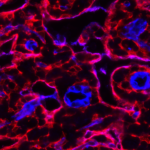Lien vers Pubmed [PMID] – 33665576
Lien DOI – 10.1016/j.isci.2021.102158
iScience 2021 Mar; 24(3): 102158
Innate lymphoid cells (ILCs) have been shown to be significantly affected in the small intestine lamina propria and secondary lymphoid organs (SLOs) of conventional lymphopenic mice. How ILCs are regulated by adaptive immunity in SLOs remains unclear. In T cell-deficient mice, ILC2s are significantly increased in the mesenteric lymph nodes (MLNs) at the expense of CCR6+ ILC3s, which are nonetheless increased in the peripheral lymph nodes (PLNs). Here, we show that T cells regulate lymph node-resident ILCs in a tissue- and subset-specific way. First, reducing microbial colonization from birth restored CCR6+ ILC3s in the MLNs of T cell-deficient mice. In contrast, T cell reconstitution resulted in the contraction of both MLNs ILC2s and PLNs ILC3s, whereas antagonizing microbial colonization from birth had no impact on these populations. Finally, the accumulation of MLNs ILC2s was partly regulated by T cells through stroma-derived IL-33.

